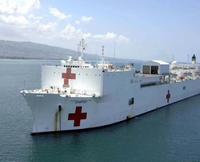In April, the U.S. Navy hospital ship Comfort sailed from Virginia with 900 doctors, nurses, engineers and civilian volunteers aboard. Comfort's mission: to deliver humanitarian aid to seven Latin American countries over a four-month period, "building relations with many countries, and strengthening already-strong bonds," in the words of mission commander Bob Lineberry, a Navy captain. In the first two months of their tour, Comfort's staff treated 29,000 patients, including performing more than 500 surgeries. They also helped rebuild hospitals and conducted medical training with local health professionals.
Operation Continuing Promise is aimed at reinforcing existing U.S. ties with Antigua, Colombia, Dominican Republic, El Salvador, Haiti, Nicaragua and Panama -- and bolstering those nations' health infrastructures. In the last three years, the Navy has launched similar "smart power" missions in East and West Africa, and the Pacific. The missions typically entail one of the Navy's two hospital ships or three-dozen amphibious ships spending four to six months visiting poor countries to render medical, engineering and security assistance.
Most U.S. Navy smart-power missions include participants from other developed countries. Brazil, Canada, France and the Netherlands sent medical personnel to reinforce Comfort's American staff. Perhaps most surprisingly, the Chinese navy has requested a consultation during Comfort's upcoming stay in Colombia. A Chinese team will board the 70,000-ton-displacement, converted oil tanker for 10 days of training. "They're putting together a hospital ship, and are interested in how we do our business," explained Navy Capt. James Ware, senior doctor aboard Comfort.

